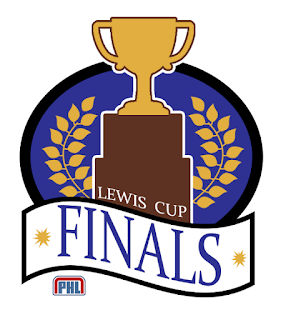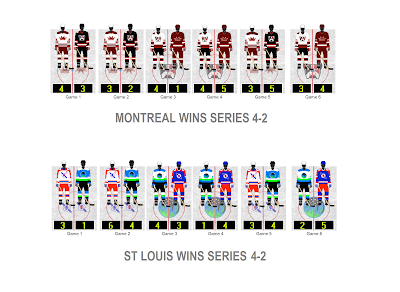 After a disappointing ending to the 1990-91 season, the
Boston Bulldogs got off to a huge start in the fall of 1991. Captain Craig Bush
scored a hat-trick on opening night in a 6-0 win over Washington and the team
never looked back, winning their first 14 games of the year. The Bulldogs would
not lose a game in regulation until their 26th game on December 2,
Ultimately finishing with 57 wins and 122 points to take first place overall in
dominating fashion. Bush finished with 104 points, while Jason Luna broke out
with 89 points of his own. “We just played with so much confidence right out of
the gate” said Bush. “Everyone is playing their role and we’re just having a
lot of fun out there.” The Bulldogs weren’t the only team in the East enjoying
success. The Montreal Royale finished with one more win than the previous year,
with 51, while Vincent Ducharme actually improved on his scoring totals with
115 points while finishing just one shy of 60 goals to once again run away with
the league scoring title. One of the few teams that did give the Royale difficulties
was their provincial rivals, the Quebec Nationale. The two teams met six times
during the season with Quebec shockingly winning five out of the six. Patrick
Lemoine was enjoying a breakout year in net that would eventually lead to a
Whyte Trophy while young Czech forward Rostislav Stransky also broke out with
an 86 point year as the Nationale finished in fifth place in the East.
After a disappointing ending to the 1990-91 season, the
Boston Bulldogs got off to a huge start in the fall of 1991. Captain Craig Bush
scored a hat-trick on opening night in a 6-0 win over Washington and the team
never looked back, winning their first 14 games of the year. The Bulldogs would
not lose a game in regulation until their 26th game on December 2,
Ultimately finishing with 57 wins and 122 points to take first place overall in
dominating fashion. Bush finished with 104 points, while Jason Luna broke out
with 89 points of his own. “We just played with so much confidence right out of
the gate” said Bush. “Everyone is playing their role and we’re just having a
lot of fun out there.” The Bulldogs weren’t the only team in the East enjoying
success. The Montreal Royale finished with one more win than the previous year,
with 51, while Vincent Ducharme actually improved on his scoring totals with
115 points while finishing just one shy of 60 goals to once again run away with
the league scoring title. One of the few teams that did give the Royale difficulties
was their provincial rivals, the Quebec Nationale. The two teams met six times
during the season with Quebec shockingly winning five out of the six. Patrick
Lemoine was enjoying a breakout year in net that would eventually lead to a
Whyte Trophy while young Czech forward Rostislav Stransky also broke out with
an 86 point year as the Nationale finished in fifth place in the East.
One of the biggest developments of the year came on December
26, 1991, when after much anticipation, the Soviet Union finally collapsed.
Suddenly, all the Russian players who had previously been unavailable would be on
their way to North America. The Toronto Racers finally had their prized
prospect in Alexei Yolkin and Yolkin did not disappoint after signing with the
Racers in late January. Yolkin had 32 points in 28 games as the Racers climbed
to fourth place. Meanwhile, 33-year-old superstar Alexander Orlov finally realized
a lifelong dream when he joined his old friend Vladimir Gaganov and signed with
Chicago. Orlov and Gaganov, along with young rookie Vladimir Kozakov formed the
“Russian Connection” line for the Shamrocks and managed to turn the season
around in Chicago. The Shamrocks had been floundering near last place by the
time Orlov arrived. After a few bumps early on, the line found chemistry and
took the team on a 12-game winning streak in February. The Shamrocks only lost 16
games in the second half of the year as they just managed to take eighth place
in the Western Conference, edging out the third-year Kansas City Twisters by
seven points for the final playoff spot.
Meanwhile, it was a disastrous season for the Seattle Grey
Wolves. After watching their captain, Pete Holloway leave for Milwaukee, the
Wolves started the season with six straight losses. By the trade deadline, with
the season long gone, new GM Bobby Vail made a very bold move, trading the
other half of the once-great duo, Jake Fairbanks, to the Quebec Nationale in
exchange for young defenseman Luke Mann. The Wolves finished tenth in the
Western Conference and out of the playoffs for the first time in ten years. “It’s
very hard to see someone like Jake go when he’s meant so much to this franchise”
said Vail. “I think the fans will appreciate in time what Luke brings to the
team.” Fairbanks went to Quebec and added valuable veteran leadership to an
already strong Nationale team.
1992 was a year of change across the league, with several
great teams from the 1980s dropping in the standings. The defending champion
St. Louis Spirits lost a lot of veteran players in the off-season and in turn,
lost a lot more games than usual in ’91-92. Appleby, playing alongside Adam
Lawless, still proved to be a dangerous offensive threat, scoring 47 goals in
what some speculated could be his final season. The Spirits managed to salvage
their season and grab the seventh playoff spot in the West. The Pittsburgh
Stingers continued the painful front-end of their rebuild, while the Nova Scotia
Claymores, racked with uncertainty about the future, dropped out of the
post-season for the first time since 1981. Year three was a huge improvement
for the Miami Stingrays, who climbed out of the league basement and won 28
games. Vancouver also saw enormous improvement, finishing third in the west
with their first-ever 100+ point season.
In Alberta, 1992 was an exciting time to be a hockey fan.
The Edmonton Northern Lights finally finished in first place in the conference,
primarily on the strength of their depth. “We don’t really have and big-name
superstar players” said head coach Rick Camford, “we do have a lot of very good
players who play their roles very well, I’m confident we can beat anyone in the
league come playoff time.” In Calgary, the Wranglers finally made their
long-awaited return to the post-season for the first time since 1983. Sergei
Krayev finished the year with 109 points, good for second in the league, while
Shannon Micheals finally enjoyed a breakout year with 90 points of his own.
Jonathan Adams was a human wrecking ball as he became known league-wide for his
devastating hits. On March 5, the Wranglers entered a game against California
on a six-game losing skid. Within the first few seconds of the game, Adams
managed to take out Matt Pope and Ilya Severov with just one huge hit. The
Wranglers beat the Nuggets 3-1 and went on the win their next eight in a row. Analyst
and former player Doug Barry summed it up best the night before the 1992
playoffs; “I’ll tell you something, the way Calgary’s goin’ right now, with
Adams, Karov (Krayev), and my buddy Micheals and everythink like that, They’re
ready to go and I’d hate to be the team that has to play Calgary in the first
round.”



















